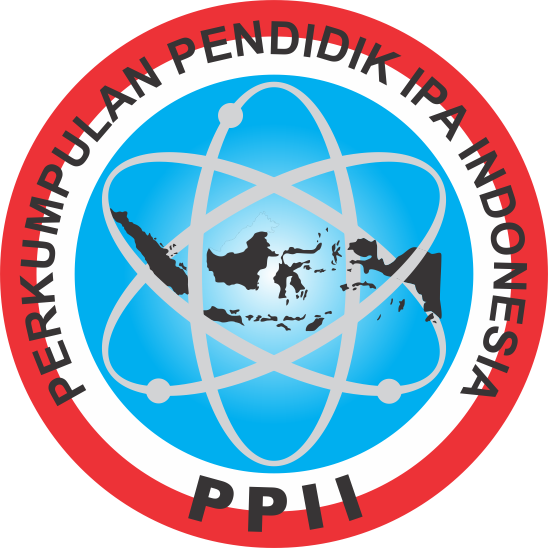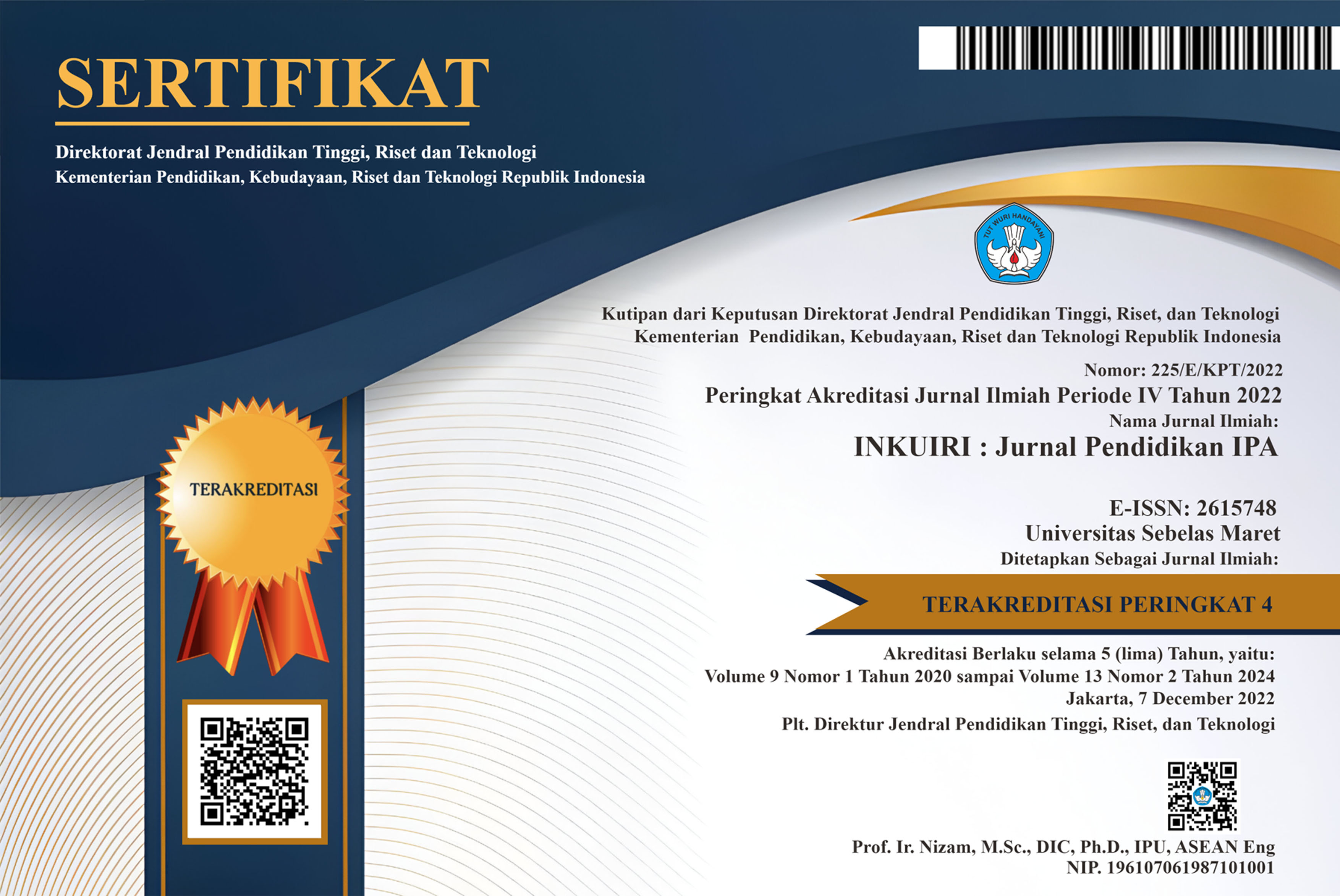Identification of Tpack Ability in Middle School Science Teachers
Abstract
In carrying out learning, teachers are required to keep up with the times by integrating knowledge of content, pedagogy and technology into learning. The ability of TPACK is very influential on learning in the classroom. For this reason, the study was conducted to determine the TPACK ability of junior high school science teachers in Central Java and East Java Provinces. The sample was taken through the cluster sampling technique on 33 science teachers through a google form-based questionnaire with 43 TPACK indicators. The results of the analysis show that 87% of teachers have TPACK abilities with good criteria and 13% of teachers have TPACK abilities with poor criteria. The lack of TPACK ability in science teachers can be caused by several factors such as age, less than optimal training attended by teachers and gender. For this reason, it is hoped that the government can help teachers improve their TPACk skills so that the teaching and learning process can be carried out optimally according to the development of the times.
Full Text:
PDFReferences
Ajizah, I., & Huda, M. N. (2020). Tpack Sebagai Bekal Guru Pai Di Era Revolusi Industri 4.0. Ta’allum: Jurnal Pendidikan Islam, 8(2), 333–352. https://doi.org/10.21274/taalum.2020.8.2.333-352
Hariati. (2022). Analisis Pembelajaran Daring di Masa Pandemi Covid-19 pada Kemampuan Technological Pedagogical And Content Knowledge ( TPACK ) Guru Sekolah Dasar. Journal of Instructional and Development Researches, 2(1), 32–47.
Hasibuan, N. (2016). Pengembangan Pendidikan Islam Dengan Implikasi Teknologi Pendidikan. FITRAH:Jurnal Kajian Ilmu-Ilmu Keislaman, 1(2), 189. https://doi.org/10.24952/fitrah.v1i2.313
Hsu, L., & Chen, Y.-J. (2018). Teachers’ Knowledge and Competence in the Digital Age: Descriptive Research within the TPACK Framework. International Journal of Information and Education Technology, 8(6), 455–458. https://doi.org/10.18178/ijiet.2018.8.6.1081
Jordan, K. (2011). Beginning Teacher Knowledge: Results from a Self-Assessed TPACK Survey. Australian Educational Computing, 26, 16–26.
Kemendikbud. (2007). Permendikbud No. 16 tahun 2007.
Khotimah, H., Astuti, E. Y., & Apriani, D. (2019). Pendidikan Berbasis Teknologi: Permasalahan dan Tantangan. Prosiding Seminar Nasional Pendidikan Program Pascasarjana Universitas Pgri Palembang, 357–368.
Koehler, M. J., & M. (2008). Introducing TPCK. In AACTE Committe on Innovation and Technology (Eds), Handbook of Technological Content Knowledge (TPCK) for Educators. Routledge.
Nasar, A., & Daud, M. H. (2020). nalisis Kemampuan Guru Ipa Tentang Technological Pedagogical Content Knowledge Pada SMP/MTs Di Kota Ende. OPTIKA: Jurnal Pendidikan Fisika, 4(1), 9–20. https://doi.org/10.37478/optika.v4i1.413
Neumann, K., Kind, V., & Harms, U. (2019). Probing the amalgam: the relationship between science teachers’ content, pedagogical and pedagogical content knowledge. International Journal of Science Education, 41(7), 847–861. https://doi.org/10.1080/09500693.2018.1497217
Rahmadi, I. F. (2019). Technological Pedagogical Content Knowledge (TPACK): Kerangka Pengetahuan Guru Abad 21. Jurnal Pendidikan Kewarganegaraan, 6(1), 65. https://doi.org/10.32493/jpkn.v6i1.y2019.p65-74
Riduwan. (2015). Dasar-Dasar Statistika. Alfabeta.
Roig-Vila, R., Mengual-Andrés, S., & Quinto-Medrano, P. (2015). Primary teachers’ technological, pedagogical and content knowledge. Comunicar, 23(45), 151–159. https://doi.org/10.3916/C45-2015-16
Rosyid, A. (2016). Technological Pedagogical Content Knowledge: Sebuah Kerangka Pengetahuan Bagi Guru Indonesia di Era MEA. Prosiding Seminar Nasional Inovasi Pendidikan.
Sam, E. A. (2009). Nigerian Inservice Teachers’ Self-Assessment in Core Technology Competences and Their Professional Development Needs in ICT. Journal of Computing in Teacher Education, 26(1), 17–12; 28. http://www.iste.org/Content/NavigationMenu/Membership/SIGs/SIGTETeacherEducators/JCTE/PastIssues/Volume26/Number1Fall2009/Fall_2009.htm%5Cnhttp://ovidsp.ovid.com/ovidweb.cgi?T=JS&CSC=Y&NEWS=N&PAGE=fulltext&D=eric3&AN=EJ856113%5Cnhttp://digitaal.uba.uva.nl
Schmidt, D. A., Thompson, A. D., Koehler, M. J., & Shin, T. S. (2009). Technological Pedagogical Content Knowledge (TPACK): The Development and Validation of an Assessment Instrument for Preservice Teachers. CIE 2014 - 44th International Conference on Computers and Industrial Engineering and IMSS 2014 - 9th International Symposium on Intelligent Manufacturing and Service Systems, Joint International Symposium on "The Social Impacts of Developments in Informat, 42(2), 2531p.
Shulman, L. (1986). Those who understand: knowledge growth in teaching. Educational Researcher, 15(2), 4–14.
Suyamto, J., Masykuri, M., & Sarwanto, S. (2020). Analisis Kemampuan Tpack (Technolgical, Pedagogical, and Content, Knowledge) Guru Biologi Sma Dalam Menyusun Perangkat Pembelajaran Materi Sistem Peredaran Darah. INKUIRI: Jurnal Pendidikan IPA, 9(1), 46. https://doi.org/10.20961/inkuiri.v9i1.41381UU No. 20 Tahun 2003. (n.d.).
Vongkulluksn, V. W., Xie, K., & Bowman, M. A. (2018). The role of value on teachers’ internalization of external barriers and externalization of personal beliefs for classroom technology integration. Computers and Education, 118, 70–81. https://doi.org/10.1016/j.compedu.2017.11.009
Yulisman, H., Widodo, A., Riandi, R., & Nurina, C. I. E. (2020). the Contribution of Content, Pedagogy, and Technology on the Formation of Science Teachers’ Tpack Ability. Edusains, 11(2), 173–185. https://doi.org/10.15408/es.v11i2.10700
Refbacks
- There are currently no refbacks.






